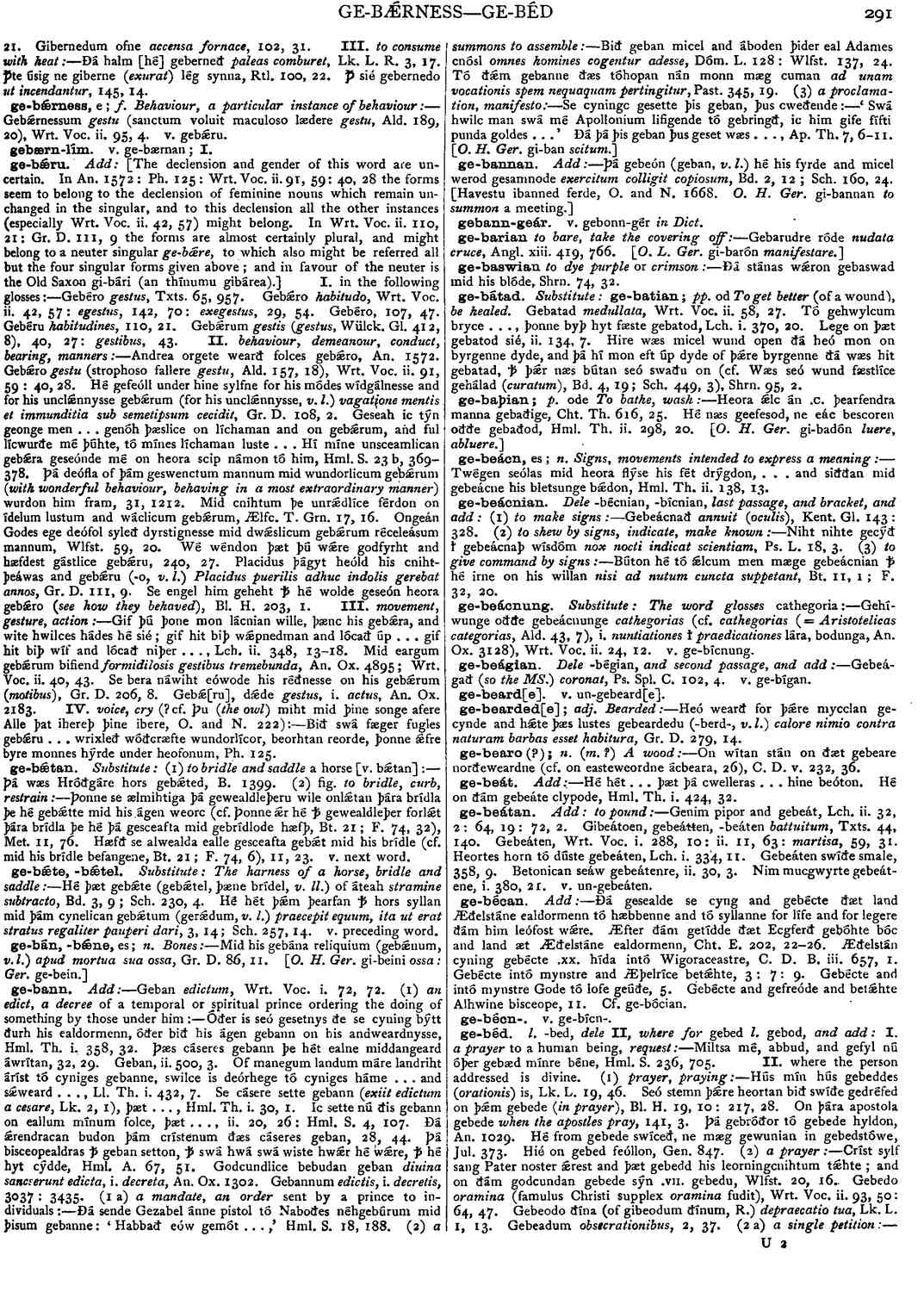ge-bǽru
-
Gebéro
gestus,
- Txts. 65, 957.
-
Gebǽro habitudo, Wrt. Voc. ii. 42, 57: egestus, 142, 70:
exegestus,
- 29, 54.
-
Gebéro,
- 107, 47.
-
Gebéru
habitudines,
- 110, 21.
-
Gebǽrum gestis (gestus, Wülck. Gl. 412, 8), 40, 27:
gestibus,
43.
-
Andrea orgete wearð folces gebǽro,
- An. 1572.
-
Gebǽro gestu (strophoso fallere
gestu,
- Ald. 157, 18), Wrt. Voc. ii. 91, 59: 40, 28.
-
Hé gefeóll under hine sylfne for his módes wídgálnesse and for his unclǽnnysse gebǽrum (for his unclǽnnysse,
v.l.) vagatione mentis et immunditia sub semetipsum cecidit,
- Gr. D. 108, 2.
-
Geseah ic týn geonge men ... genóh þæslice on líchaman and on gebǽrum, and ful lícwurðe mé þúhte, tó mínes líchaman luste ... Hí míne unsceamlican gebǽra geseónde mé on heora scip námon tó him,
- Hml. S. 23 b, 369-378.
-
Þá deófla of þám geswenctum mannum mid wundorlicum gebǽrum (
with wonderful behaviour, behaving in a most extraordinary manner
) wurdon him fram,- 31, 1212.
-
Mid cnihtum þe unrǽdlíce férdon on ídelum lustum and wáclicum gebǽrum,
- Ælfc. T. Grn. 17, 16.
-
Ongeán Godes ege deófol syleð dyrstignesse mid dwǽslicum gebǽrum réceleásum mannum,
- Wlfst. 59, 20.
-
Wé wéndon þæt þú wǽre godfyrht and hæfdest gástlice gebǽru,
- 240, 27.
-
Placidus þágyt heóld his cnihtþeáwas and gebǽru (-o,
v.l.) Placidus puerilis adhuc indolis gerebat annos,
- Gr. D. 111, 9.
-
Se engel him geheht ꝥ hé wolde geseón heora gebǽro (
see how they behaved
),- Bl. H. 203, 1.
-
Gif þú þone mon lácnian wille, þænc his gebǽra, and wite hwilces hádes hé sié; gif hit biþ wǽpnedman and lócað úp ... gif hit biþ wíf and lócað niþer ...,
- Lch. ii. 348, 13-18.
-
Mid eargum gebǽrum bifiend
formidilosis gestibus tremebunda,
- An. Ox. 4895; Wrt. Voc. ii. 40, 43.
-
Se bera náwiht eówode his réðnesse on his gebǽrum (
motibus
),- Gr. D. 206, 8.
-
Gebǽ[ru], dǽde
gestus, i. actus,
- An. Ox. 2183.
-
Bið swá fæger fugles gebǽru ... wrixleð wóðcræfte wundorlícor, beorhtan reorde, þonne ǽfre byre monnes hýrde under heofonum,
- Ph. 125.
Bosworth, Joseph. “ge-bǽru.” In An Anglo-Saxon Dictionary Online, edited by Thomas Northcote Toller, Christ Sean, and Ondřej Tichy. Prague: Faculty of Arts, Charles University, 2014. https://bosworthtoller.com/47158.
Checked: 0